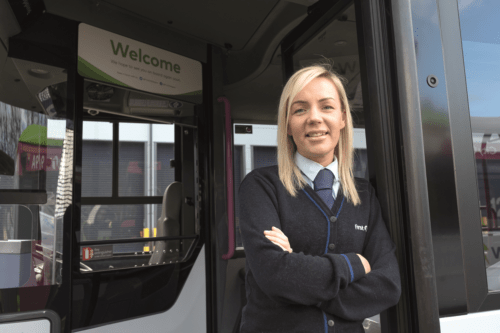
The introduction of part-time bus driver roles has resulted in 50% of new hires being women at First Bus, an increase from just 2% in 2017
First Bus has been praised by Close the Gap, a Scottish organisation which works with policymakers, employers, and unions on issues around women in the workplace and the gender pay gap, for continuing to drive meaningful action to tackle the barriers faced by women to joining traditionally male-dominated roles. Its latest report points to actions taken by First Bus across recruitment, progression and promotion for women, and progress made against the four targets set out in its first pay gap report in 2018 and which have led to its female workforce doubling since 2017.
Through its recruitment strategies, First Bus has taken long-term action to attract more women and has doubled its female workforce since 2017; a significant contributor has been a trial of part-time bus driver roles, offering 15 to 25 hours per week, which the report found has resulted in 50% of new hires being women, up from 2% in 2017.
First Glasgow bus driver Danielle McLaren, who joined First Bus after working in retail for 13 years, said: “The hours can sometimes seem full on for bus drivers and their families. At First Bus, when my family needed more of me, I could ask for support. That allowed me to design my shifts around them, giving me time to spend with my kids and partner, all with a great wage.”
The report highlights the Step Up and Step Forward development programmes introduced by First Bus as important steps in increasing progression and promotion for women within the company. Over 180 women have participated in the Step Up development programme designed for women looking for their first line manager role, with 27% of those now promoted. Meanwhile, 45% of participants have achieved a promotion in the Step Forward programme for female line managers in preparation for more senior roles.
Gareth Hind, Head of Equality, Diversity and Inclusion for First Bus UK, said: “We are delighted to have been recognised in this way by Close the Gap and it is great credit for a lot of hard work that has been done across First Bus in recent years to make such significant progress over a short period of time.
“This is only the start, and we are continuing to work closely with our teams to engage and create a truly inclusive environment across the UK within First Bus. Recently this can be seen in the introduction of our Balance Inclusion Network, which is one of six inclusion networks in our business designed to bring together people to listen, learn and act on how we can accelerate our journey towards a gender inclusive business.
“Across March and April this year, we launched our Reverse Mentoring Programme bringing together 20 male senior leaders to be mentored by 20 women from across First Bus allowing their lived experiences to be shared and to help our senior leaders understand the challenges they face. We also started our Female Intentional Allyship Programme which will see over 100 women in First Bus, from drivers through to leadership positions, be developed and mentored by our senior leadership in areas including imposter syndrome, confidence, impact, gravitas, interview skills and techniques, and much more.”
Anna Ritchie Allan, Executive Director of Close the Gap, said: “Close the Gap is really pleased to share good practice when we see it happening. First Bus has developed measurable actions based on specific issues identified in its gender pay gap analysis. The company has reported on the same four commitments since first reporting in 2018, and has made clear progress, including almost doubling the number of women in the workforce and enabling more women to progress to senior roles. We know that this focus on long-term solutions instead of smaller-scale actions is critical to tackling the causes of the gender pay gap.”

